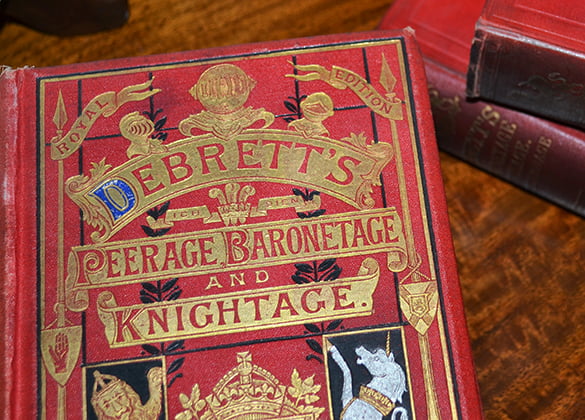
Baronets constitute an entirely separate dignity of their own, the Baronetage. As distinct from barons, baronets are neither members of the peerage nor of the knightage (these titles are conferred by The Crown for life only).
As holders of a hereditary dignity, their place in the table of general precedence is below the sons of Lords of Appeal in Ordinary (judges who are always barons) and above Knights of the Garter.
In the past 'Bart' was the favoured abbreviation to follow the name of a baronet on an envelope, or on a list of names, and this may still be used if desired. However, 'Bt' is now more commonly used.
The hereditary order of baronets in England was instituted by letters patent by King James I on 22 May 1611, for the settlement of Ireland. He offered the dignity to 200 gentlemen of good birth, with a clear estate of £1,000 a year, on condition that each should pay into the king's exchequer in three equal instalments a sum equivalent to three years' pay to thirty soldiers at 8d per day per man.
The baronetage of Ireland was instituted on 30 September 1611; and the baronetage of Scotland (or Nova Scotia) on 28 May 1625, for the establishment of the plantation of Nova Scotia.
After the union of England and Scotland in 1707, no further baronets of England or Scotland were created, the style being changed to baronet of Great Britain. With the union of Great Britain and Ireland in 1801, all baronets subsequently created were under the style of the United Kingdom.
The creation of baronetcies lapsed in 1964; in 1990 the Conservative Government announced that this honour would be given to Denis Thatcher, but there have been no further creations.
The Official Roll of the Baronetage is the formal list where all baronetcy creations and successions are recorded, as evidence of their rank and status. It was instituted by Royal Warrant of King Edward VII dated 8 February 1910. Under the terms of a further royal warrant dated 10 March 1922, anyone claiming a baronetcy may apply to be entered on the Roll.
More information about claiming a baronetcy, can be found here.
From 1919 until 2006 the Roll of the Baronetage was kept at the Home Office, but it is now kept at the Ministry of Justice by the Registrar of the Baronetage.
The vast majority of baronetcies may descend in the male line only, but there are a few (all Scottish) that may descend to heirs-general.
Dalyell of the Binns (NS) 1685 Dunbar of Hempriggs, Caithness-shire (NS) 1706 Hope-Dunbar of Baldoon (NS) 1664 Maxwell Macdonald of Pollok, Renfrewshire (NS) 1682 and 1707